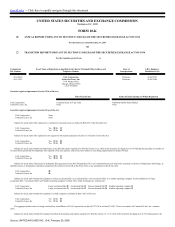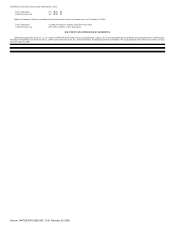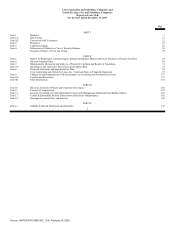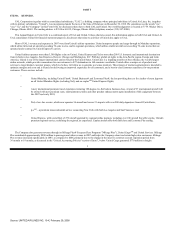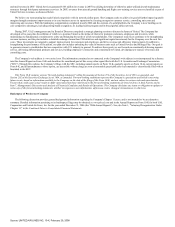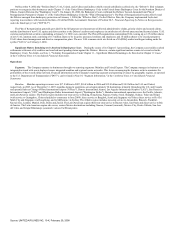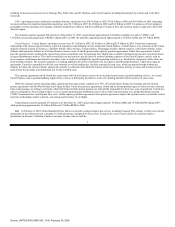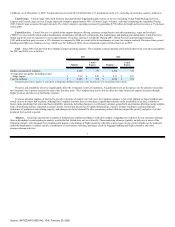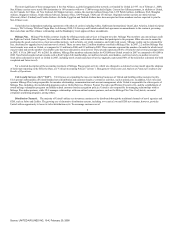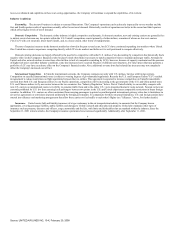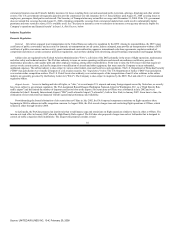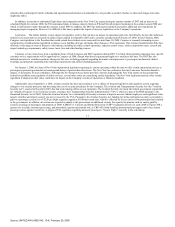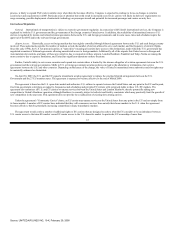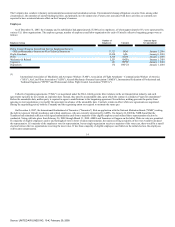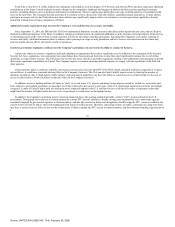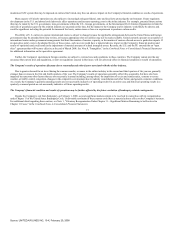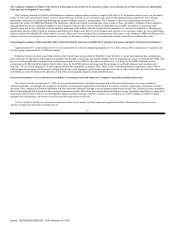United Airlines 2007 Annual Report Download - page 11
Download and view the complete annual report
Please find page 11 of the 2007 United Airlines annual report below. You can navigate through the pages in the report by either clicking on the pages listed below, or by using the keyword search tool below to find specific information within the annual report.
commercial insurers canceled United's liability insurance for losses resulting from war and associated perils (terrorism, sabotage, hijacking and other similar
events). The U.S. government subsequently agreed to provide commercial war-risk insurance for U.S. based airlines until August 31, 2008 covering losses to
employees, passengers, third parties and aircraft. The Secretary of Transportation may extend this coverage until December 31, 2008. If the U.S. government
does not extend this coverage beyond August 31, 2008, obtaining comparable coverage from commercial underwriters could result in substantially higher
premiums and more restrictive terms, if it is available at all. See "Increases in insurance costs or reductions in insurance coverage may adversely impact the
Company's operations and financial results" in Item 1A, Risk Factors, below.
Industry Regulation
Domestic Regulation.
General. All carriers engaged in air transportation in the United States are subject to regulation by the DOT. Among its responsibilities, the DOT issues
certificates of public convenience and necessity for domestic air transportation (no air carrier, unless exempted, may provide air transportation without a DOT
certificate of public convenience and necessity), grants international route authorities, approves international code share agreements, regulates methods of
competition and enforces certain consumer protection regulations, such as those dealing with advertising, denied boarding compensation and baggage liability.
Airlines also are regulated by the Federal Aviation Administration ("FAA"), a division of the DOT, primarily in the areas of flight operations, maintenance
and other safety and technical matters. The FAA has authority to issue air carrier operating certificates and aircraft airworthiness certificates, prescribe
maintenance procedures, and regulate pilot and other employee training, among other responsibilities. From time to time, the FAA issues rules that require air
carriers to take certain actions, such as the inspection or modification of aircraft and other equipment, that may cause the Company to incur substantial,
unplanned expenses. The airline industry is also subject to various other federal, state and local laws and regulations. The U.S. Department of Homeland Security
("DHS") has jurisdiction over virtually all aspects of civil aviation security. See "Legislation," below. The U.S. Department of Justice ("DOJ") has jurisdiction
over certain airline competition matters. The U.S. Postal Service has authority over certain aspects of the transportation of mail. Labor relations in the airline
industry are generally governed by the Railway Labor Act ("RLA"). The Company is also subject to inquiries by the DOT, FAA and other U.S. and international
regulatory bodies.
Airport Access. Access to landing and take-off rights, or "slots," at several major U.S. airports and many foreign airports served by United are, or recently
have been, subject to government regulation. The FAA designated Ronald Reagan Washington National Airport in Washington, D.C. as a "High Density Rule
traffic airport" and has limited the number of departure and arrival slots at the airport. Slot restrictions at O'Hare were eliminated in July 2002 and were
eliminated at John F. Kennedy International Airport ("JFK") and LaGuardia Airport ("LaGuardia"), both in New York, in January 2007. From time to time, the
elimination of slot restrictions has impacted United's operational performance and reliability.
Notwithstanding the formal elimination of slot restrictions at O'Hare in July 2002, the FAA imposed temporary restrictions on flight operations there
beginning in 2004 to address air traffic congestion concerns. In August 2006, the FAA issued a longer-term rule restricting flight operations at O'Hare, which
remains in effect through October 2008.
At LaGuardia, the FAA has proposed an interim rule that would impose caps and restrictions on flight operations similar to those in effect at O'Hare. The
interim rule took effect in January 2007 when the High Density Rule expired. The FAA has also proposed a longer-term rule at LaGuardia that is designed to
control air traffic congestion there indefinitely. The longer-term proposal contains several
10
Source: UNITED AIR LINES INC, 10-K, February 29, 2008

